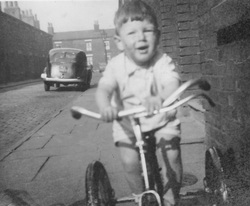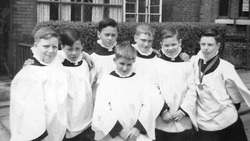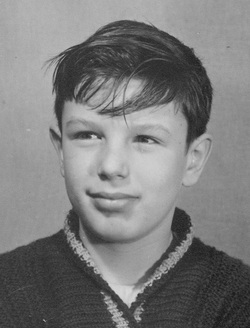
African proverb... a cultural story with deep meanings, and I thought it was
worth spending the time to reflect on my own early life. My first thought was
that this is a story about lots of people being actively involved in helping and
enabling a child to grow up. That seems obvious I suppose most of us have
parents, siblings, aunts/uncles, cousins and grandparents and I guess in an
African village all would have played a part.. But I interpreted the story to mean that other members of the village would also be involved..perhaps to teach essential skills and pass on cultural wisdom that was essential for the health and survival of the village..
There was nothing exceptional about my childhood. I was born in 1950 in the middle of Manchester.. and my earliest memories (less than 5) are of a street of terraced houses (Camelford St) with front doors that opened onto the street. I have quite a lot of fragments of early memories and impressions of my surroundings. I know we had good neighbours who sometimes looked after me but I'm sure my early upbringing was dominated by mum and dad and home. When I was 5 I moved to the northwest side of Manchester a place called Monton.. to a home with a front and back garden..I remember that moving was a traumatic experience fore me. It was still a town, with a cotton mill and canal at the end of the road, but at least there were fields to play in..and without too many cars it was safe to play in the street..which I did with the kids nearby... the neighbours were friendly but I don't remember much of a community in the way I imagined the African proverb describes. As I became increasingly aware of who I was. I learnt what was right and wrong and suffered the consequences (usually a smack and being sent to bed) if I did not follow the rules or crossed a boundary...like playing on the railway.. or falling in the canal..or answering back..
We considered ourselves as a good working class family you achieved through hard work and a good job was you aim in life. My parents ambition for me was not very great at that stage.. you left school at 16 and got a job... my dad left school at 14 and what was good enough for him was good enough for me.. (at that stage).. so I don't think I was encouraged in the
sense of ever thinking that education was a way of making something of yourself. My mum had to look after all of us.. by the time I was 10 there were 5 of us! so she had her work cut out. Being the eldest I felt I was the one that was treated the harshest and I was the one that was always pushing at the boundaries .. like bed time.. So perhaps that became part of my
chararcter..
My mum was the one we spent most time with and she was the one who had to keep us under control and look after us..she worked very hard and for years she never had a pair of knitting needles out of her hands. She had a tremendous positive spirit and always saw the good in everyone and everything (still does) and although her ambitions for us were also limited she never
stopped encouraging us.. I owe my own positivity to her I'm sure. I know I was loved and cared for and their role model as parents has stood me in good stead for being one myself.
My father's gift to me was his work ethic (his own a reaction to his father who had been unemployed for most of his childhood when the family had suffered real poverty and led to his mothers early death). Whatever the weather he cycled the five miles to work and never missed a dayunless he literally couldn't climb on his bike. He suffered from bronchitis and his presence was often announced by coughing.. I had to do my share of jobs like run errands and I was also volunteered! to cut
the hedges and grass of neighbours. I remember resenting it but if I'm honest all these things fed into me.
I'm sure I leant at primary school. I certainly learnt to be a member of a community, make friends, treat people with respect and
follow rules pushing at them from time to time and suffering the consequences.. I remember being caned on several occasions. My school had not learnt how to get pupils through the 11+ with only one or two passing each year so no one was
surprised that I didn't pass it.

and gave me my first taste of freedom away from parental control! Day trips by
train to Derbyshire and the Lake District or the N Wales coast... In all of
these activities I think I learned much from just being out in the world and
interacting with people and adults. When I think more deeply about this I think
that both choir and cubs taught me the value of being part of a community, of
learning their cultures and being part of it, of doing things together and in
the case of the choir practicing an anthem over and over again and then performing it. I can with the benefit of hindsight see that this was important learning. Both cubs and choir required discipline and commitment.. once a week for cubs .. Sunday morning and evening for choir and Friday for practice..they both taught me a sense of belonging and they both taught me that if you stick at something long enough, with time you will become a leader one day.... head chorister in the choir or a sixer (responsible for at least people) in the cubs.. When I look back these were important things to learn at that age and I'm sure they shaped me psychology and spiritually (though not religeous).

not who I wanted to be. Going to secondary school was my first defining moment - a gym, playing fields and organised sport was all I needed to become who I wanted to be. Sport (any) and teams became my life..and I was good at these things..my confidence and belief in myself grew. I loved my school and just being in the environment helped me grow up.. I was in the top class and I don't know how but I came top in my first term which entitled me to a crack at the 12+ exam. The first of three important second chances in my formal education. I was reluctant to try for the Grammar school as I liked my Secondary Modern school so much. My mum and dad thought I should try and sent me to see the vicar who they thought could influence me and he did.. I decided I would go and do the exam and then decide what to do.. I passed and then had to make the decision which was a no brainer for my parents but more difficult for me.. Needless to say I went and that was my second defining moment as a child.
Looking back I did not have any sense that I was raised by a community.. perhaps a village would have been different....my values were learnt through family, school and church, there were adults who undoubtedly influenced me and particularly controlled what I did but I think I learnt more from my friends and just being out and about in the world : a pattern that continued through my teens. Growing up and becoming me was a social process but it was more to do with participating in life than being shaped and influenced by significant others.
I am not sure that my early childhood story plays well into my interpretation of it 'takes a village idea'.. My story I think reflects more the idea that as we grow up we have to find and put ourselves into different communities in order to learn from
others and gain the experiences that will help us develop as people. Nor does my story play very well into the saying “Give
me the child until he is seven and I’ll give you the man”. While early life influences are very important, and we
they most certainly shape our beliefs and values, once we become aware of who we are and of our own agency, there are
opportunities that if we take them will enable us to become the person we want to be indeed perhaps its the way we start to learn who we want to be, We are not rigidly held in the mould of ourselves as a seven year old.





 RSS Feed
RSS Feed